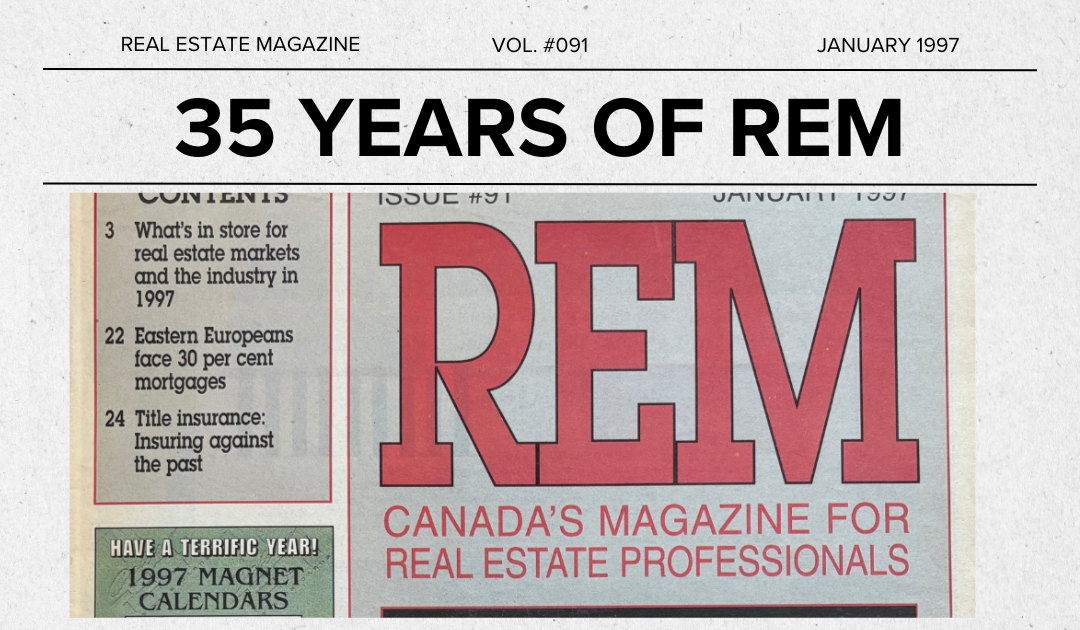To mark 35 years of Real Estate Magazine, we’re sharing articles from past issues. This article appeared in issue #91 in January 1997 and was written by Kathy Bevan and Susan Doran.
How will real estate fare this year? What changes are in store for the industry itself? REM’s Kathy Bevan and Susan Doran asked real estate experts across the country for their predictions.
Tom Bosley
President, Canadian Real Estate Association
Toronto
“I think 1997 should generally be the same or slightly better than 1996, and 1996 was a pretty good year. We’re still seeing markets that are not as much interest-rate driven as consumer confidence-driven, but we have too many strengths going for us right now to have anything but a good market. Volume should be up by about three per cent; prices may go up by about two to three per cent in some parts of the country. We’re going to see a shortage of good product create a bit of a vacuum in some parts of the country as well.
“Technology will still have the greatest impact on our industry this year. The number of salespeople leaving the industry will stabilize, and we’ll see younger ones starting to take over a greater share of the market. One good reason for that will be their better understanding of technology and how it can help them do business better. This has never been an easy industry in which to make money, and that won’t change even with better markets, so salespeople need to use all the tools available to them.
“We’re seeing a number of provinces now with self- or co-regulation, and that should include Ontario within a year. That has moved our industry toward stronger educational requirements for Realtors. That’s good for everyone because it means stronger professional standards for our industry.”
Don Lawby
President, Century 21 Canada
Vancouver
“In markets across Canada, we’re expecting a good spring and a strong fall because of the economic conditions and current interest rates. We’re going to see a continued recovery in eastern Canada, particularly Ontario, with four to six percent price increases. Quebec should see a fairly good market this year too, but no price increases. Most other areas should see pretty stable prices. Atlantic Canada, Manitoba, Alberta, and Saskatchewan we see performing fairly much as they did last year. The lower mainland area of B.C. will be a trouble spot because the prices continue to be too high for the houses on the market here. We’re also experiencing some political uncertainty provincially, which is being reflected in a lack of consumer confidence.
“The issue that will have the most impact on our industry this year will be the increasing competition between real estate companies. We will continue to see organizations move to more recognized national names. The real estate business has been through some tough times, and it will continue to be a tough business to be in. Brokerages will see more pressure to run financially sound operations, while salespeople continue to press for the best deal they can get. We’ll see continued movement by some companies, ourselves included, toward the one-stop shopping approach to serving consumers—making transactions as convenient as possible for everyone concerned. The impact from this movement won’t be immediate, but it will be felt over time.”
Tom Clark
Vice-President & COO, HomeLife Realty Services
Toronto
“We’re expecting more of the same in 1997—a good market overall. The emergence of first-time buyers should continue, with stable interest rates and good affordability. Alongside that, we expect to see that a significant number of former first-time buyers will be moving into their second homes this year. That should have a very positive ripple effect on the market.
“I don’t think there will be a significant influx of new salespeople entering our business, although a number who have been outside the industry for a while may re-enter this year. I think the industry as a whole will still see some shrinkage this year. There will also be a lot of talking behind the scenes between real estate companies regarding mergers and consolidations.
“The factor that continues to have the greatest impact on our industry is computerization—Internet, Intranet, email and so on. All of these communication tools will result in some innovative ways of marketing. Notwithstanding all of this technology, however, brokerages will still have to provide a very professional level of service to consumers—that’s the real bottom line. We need to continue to educate the public about the benefits of home ownership, and the services we have to offer.”
Gilles Lauzon
President, Countrywide Realty Quebec
Gatineau, Quebec
“I expect residential real estate will be good next year, but with only a small increase, if any. This year (1996) was better than 1995; it would be impossible to be worse, and 1997 should be the same or better than 1996.
“In the residential market in this area, homes under $100,000 are selling very well. The market segment of $100,000 to $150,000 is good, but not great. Over that, it’s tougher. Homes priced over $200,000 are only about six or seven percent of the market. The average house price in the area is about $88,000.
“The commercial market is a longer story. Prices are very low. But in this region, things are growing fast because of the many big chains that are opening up in Gatineau—Price Club, Walmart, Canadian Tire, Winners, Zellers. Over two million square feet of commercial space has opened up in the past 18 months. But for small companies, business is not so good—there is too much competition from the big guys. So the prices of small commercial buildings are going down.
“The presence of the federal government in nearby Ottawa where there’s been lots of job cutting will not have a positive effect on the market here—although the government already has cut what it’s going to cut, I think. But on the other hand we have all the new commercial development in the area, so the market will be stable next year.”
Colum Bastable
President and CEO, Royal LePage Real Estate
Toronto
“The continuing low interest rates are obviously good for residential markets across the country, and they seem to be giving everyone a boost in confidence. We’re expecting these low rates to continue at least into mid-1997.
“…we should see a good year. We should also see some price increases.
“With the continuing low interest rates, and given the support that we’ve seen for housing in the new federal budget, we have strong supporting demand, so prices could edge up one or two percent in parts of the country. In Ontario, the markets are recovering from the recession; prices are not yet at their peak but continue to rise in certain pockets like Toronto. For the West, we’re looking at a mixed bag. Vancouver remains active but affordability remains an issue, which has led to some softening of the market.
“There are also some consolidations taking place in the U.S., and HFS is shifting its focus away from real estate toward the hospitality industry. These moves may bring new ideas and partnerships into Canada, helping with marketing or business efficiencies. But ultimately, consumers are the ones who will benefit most from competition and innovation as the markets continue to evolve.”
Harold Waddell
President and CEO, Realty World Canada
Burnaby, B.C.
“Our brokers and sales associates are predicting this will be a good year across the board for real estate in Canada. We don’t expect much of an increase in prices across the country, with a few exceptions—perhaps one to two percent, perhaps three percent in certain areas.
“In B.C., we’re predicting tremendous growth, good growth in Alberta, Saskatchewan and Manitoba and a resurgence in Ontario. What we should see everywhere are good, steady markets, which overall are a lot healthier than the wild rides we’ve seen in the past.
“I think we’ll continue to see a great impact from first-time buyers, and baby boomers paying off debts. We’ll need a lot of new product to meet increasing demand. I suspect we’ll continue to see some shrinkage in the numbers of salespeople working in our industry, and that will continue over the next five years or so.
“Technology will continue to have an impact on how our industry performs. The Internet is just coming into its own with salespeople and brokers, and we’ll all have to keep on the cutting edge to take advantage of everything technology has to offer.”
John Bearden
President, Coldwell Banker Affiliates of Canada
Toronto
“The revival in the market is going to continue in a strong way this year. Affordability is the best we’ve seen in a long time, and there’s a strengthening happening in consumer spending that I predict could be some eight percent higher than spending last year. Prices should move up about two and a half percent, and mortgage rates might move downward another quarter to half a point over the year. We’re going to continue to see a real strength in first-time homebuyers, and I think that could lead to an exceptionally strong move-up market as well, and those two segments will be the primary impetus for our markets this year.
“There are three factors I believe will impact our industry in 1997: technology, ongoing consolidation at all levels within the industry; and the choices salespeople themselves will be making. Technology’s importance is really how it is integrated into the service we’re providing to our customers. Over the next two years, salespeople are going to be increasingly inclined to access the Internet and use technology (such as laptops) right in the face of their customers.
“Consolidation of real estate firms, and salespeople within those firms, will be a strong factor in how our industry performs this year. Brokers looking for ways to increase their margins will continue to consolidate, merge, and acquire. The top 10 to 15 percent of salespeople will capture a larger share of transactions than ever before. Salespeople will also be taking a hard look at the services their brokers provide and the costs they incur. They will be seeking to better themselves through concise, contemporary learning opportunities to get every edge they can.”
Bob Cherot Jr.
President and CEO, Re/Max of Western Canada
Kelowna, B.C.
“We’re expecting a good year in ’97, with markets in Saskatchewan, Alberta, and Manitoba leading the pack. B.C. should have a more normal market than last year—a good market, without extremes.
“Alberta should really be our shining star, especially in terms of sales. Markets there are being led by Calgary, where CP’s new corporate headquarters and thriving oil and gas companies are having a positive effect. In Winnipeg, condo developments are really taking off. There and in Saskatchewan, people are taking a second look at where their dollars go when they’re about to retire. They’re thinking about downsizing, rather than moving away, and taking winter holidays in the sunny south when it’s too cold up here.
“As for impact on our industry this year, in a word: technology. It seems whenever you get close to the turn of a century, something major changes. For us, that change is technology. We’ve got teenagers surfing the Internet. They’ll be out in the workplace soon and leading change. If real estate salespeople and brokers don’t keep themselves abreast of these developments, we’re all in trouble. This doesn’t just mean knowing how to use the tools but understanding how to leverage them effectively to serve clients better.”
Susan Doran is a Toronto-based freelance writer who has been contributing to REM since its very first issue.
















It is indeed interesting to see how cyclical the industry is for most of these opinions regarding the market are almost as true today as they were in 1997. I suggested to my daughter that she share these with her agents and she jokingly replied that most of her agents were not alive then!!
Tom Bosley
It would be interesting to print today’s current state of the market Canada-wide. Maybe even stats? Would be great eye opener for those who weren’t born yet in 1997.😆😁